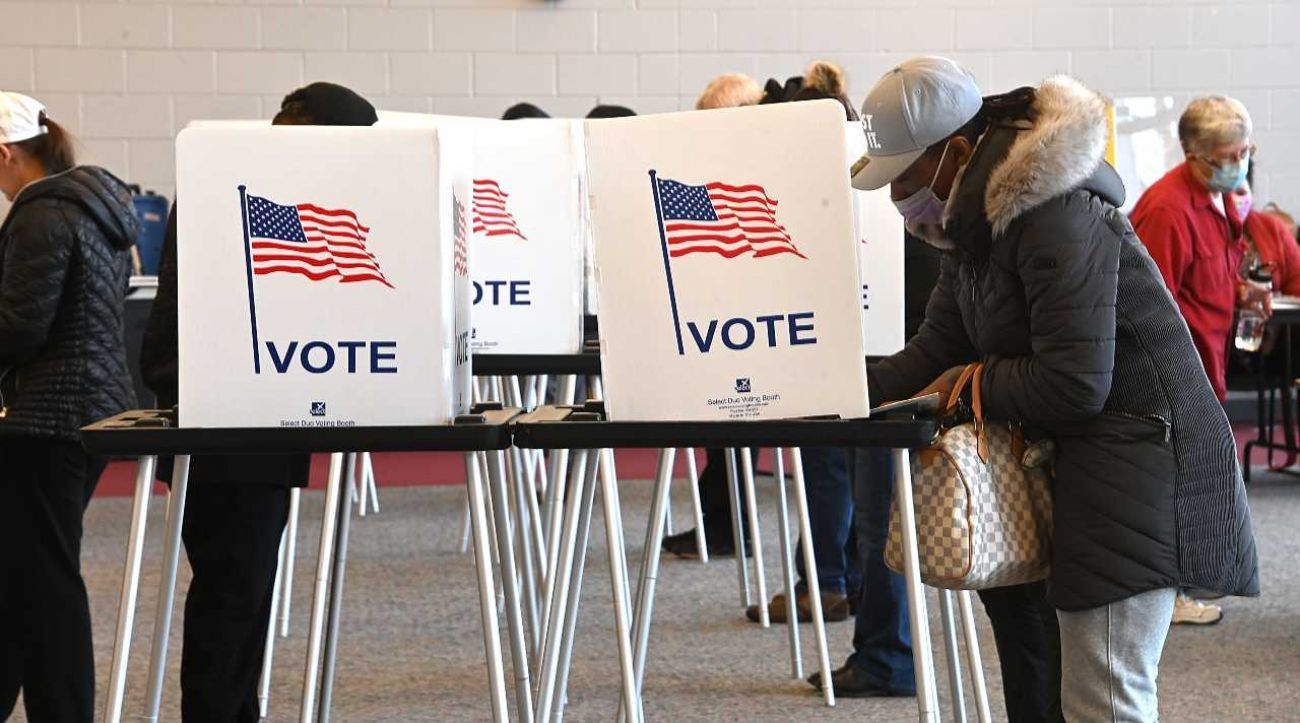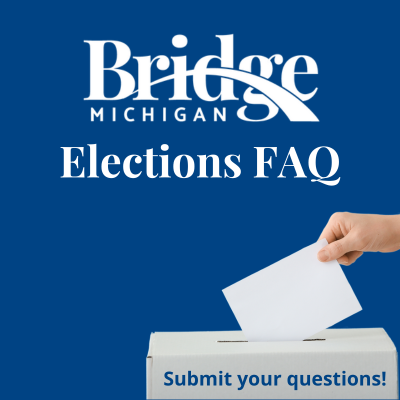Dems push ‘Michigan Voting Rights Act.’ Election clerks have concerns

- Proponents say proposed Michigan Voting Rights Act would supplement federal law that has been chipped away by courts
- Opponents say it’ll be expensive and invasive, and create a dangerous precedent inside polling places.
- Local clerks who administer Michigan elections are concerned about potential costs and penalties for human error
Votebeat is a nonprofit news organization reporting on voting access and election administration across the U.S. Sign up for Votebeat Michigan’s free newsletter here.
The Michigan Voting Rights Act, a package of four bills moving through the Legislature, has a weighty name and a noble purpose: to serve the state’s voters better.
But some people whose job is to serve the voters say the legislation makes them a little nervous.
Supporters say the bills will supplement the federal Voting Rights Act, which passed in 1965 but has been slowly eroded by court decisions. Opponents say it’ll be expensive and invasive, and create a dangerous precedent inside polling places.
And clerks, who would have to actually administer elections under the new rules, say they have a lot of concerns about the MVRA, though some are not prepared to think about laws that wouldn’t come into play until next year at the soonest, as they prepare for a general election that’s already underway.
“I'm not really excited about this as it stands," said Michael Siegrist, Canton Township clerk and second vice president of the Michigan Association of Municipal Clerks.
Related:
- Michigan voter rolls inflated by 500K. State says it’s no issue. GOP disagrees
- Michigan elections FAQ: Why bloated voting rolls don’t lead to fraud
- Michigan elections FAQ: Do early, absentee ballots count if a voter dies?
He and other clerks say they’re nervous about the potential costs that would largely be passed on to municipalities as well as the proposed consequences for what could be simple human errors in the course of running an election.
The state municipal clerks association is officially neutral on the package of bills, as is its county-level counterpart, the Michigan Association of County Clerks. Both groups had a hand in shaping the legislation, but say there’s still room for improvement.
At its core, the bills aim to prevent voter suppression, expand ballot access to more language communities, create a statewide voting data clearinghouse, and clarify protections for voters who need help casting their ballot.
But half a dozen local clerks around the state told Votebeat that they’re so focused on preparing for the November election, that they can’t even consider what the changes under the proposed legislation could mean for their community. Already, several clerks said, this year’s election looks different from past elections because of a string of legislative and constitutional changes in recent years, including the introduction of early in-person voting, which started Saturday in Detroit and will begin in other municipalities no later than Oct. 26.
"The concern is they are about to pass another very complicated bill that has penalties for local election officials who are really trying their hardest to actually deliver the elections under this new framework that has called for the largest enfranchisement of voters in Michigan history," Siegrist said.
Although the bills passed through the Michigan Senate last month, there is still a lot of time to change them. Rep. Penelope Tsernoglou, an East Lansing Democrat who chairs the House elections committee, said the bills likely won’t come before the committee before November.
Some of the changes election officials say they hope to see would require some significant rewrites before the bills became law.
The bills are a legislative priority for Secretary of State Jocelyn Benson, a Democrat. As with many voting reforms, their ultimate scope — not to mention their passage — depends on the Democrats’ narrow majority in the Michigan Legislature, which is at stake in the November election.
MVRA would require more support for language groups
The name of the legislation is purposeful. The Michigan Voting Rights Act seeks to tackle much of what the federal Voting Rights Act initially did: expand ballot access for voters who use languages other than English, and stop local and state governments from imposing new laws that could create barriers to voting based on disability, race, or other factors.
Recent court decisions have chipped away at many such protections in the federal law.
“Candidly, it’s incumbent on the state to take on the mantle and provide protection to our voters that they once enjoyed under federal law,” said Ingham County Clerk Barb Byrum, a supporter of the legislation.
But in some areas, the MVRA seeks to go beyond what the federal Voting Rights Act once offered.
Section 203 of the Voting Rights Act, for instance, requires jurisdictions around the country to offer language assistance to voters if more than 5% of voting-age citizens are in the same language minority group and don't understand English well enough to use it to vote. The act focuses on languages with "a history of exclusion," according to the Department of Justice, which primarily means Spanish, as well as Asian and Native American languages.
In Michigan, Section 203 has required some western Michigan communities, such as Fennville and Clyde and Covert townships to offer election materials, such as ballots, instructions, and assistance in Spanish, while Hamtramck in Wayne County must offer them in Bengali.
Arabic, a language common to many communities around the state, is not included among the language groups federally designated as having a history of exclusion under Section 203. But under the Michigan Voting Rights Act, it would be covered in several places.
The legislation would expand language support to any language community that doesn’t understand English well and makes up more than 5% or more than 10,000 of the voting-age citizens in an area. Starting in 2030, the threshold would drop to 600 people total, or 2.5% of voting-age citizens, as long as that 2.5% was more than 100 people.
It would be a significant expansion of the language protection, Byrum said, but a necessary one.
More than 530,000 Michiganders older than 18 speak a language other than English, according to data from the Census Bureau. More than a quarter of those people speak Spanish.
In a large city like Detroit, the changes proposed by the MVRA would likely require support in Spanish, Arabic, and other languages, based on Census Bureau data.
Implementing such support — including translations of complex ballot issues, plus printing of election materials — would increase the costs of elections significantly. Logic and accuracy testing, used to ensure each voting machine registers votes properly, would also take longer because of the number of ballot styles.
Because the current version of the bills don’t allocate separate funding, clerks would likely have to take resources away from other functions.
Cheri Hardmon, spokesperson for the Department of State, said the department believes lawmakers should address funding at the same time that the House considers the bills.
“We will continue to work with the legislature to ensure that any bills that get passed into law are as strong as possible and address the concerns of voters and clerks alike,” Hardmon said.
To achieve that, Siegrist said, legislators would likely need to reshape the language sections to make the requirements more feasible.
"Other states have been able to deliver ballots and materials to language minorities ... in a more efficient manner that's inclusive and accessible and cost-effective," he said. "I would love to see our legislature look at that."
California is one state that requires communities to go further than federal law in providing language access. In Los Angeles County, for instance, Section 203 requires ballot access in five languages, including Spanish and Chinese, while state law requires 14 additional languages, including Farsi, Japanese, and Russian.
In California, the state requires certain polling places to make at least one translated copy of the ballot available for voters to look at alongside their English-language ballot. Voters can use it as a reference.
Clerks fear consequences for violations
Several clerks said they were particularly concerned about the consequences that they and their local governments could face as part of this proposal.
Bill 401 makes clear that governments cannot impose prerequisites on voters or cause any sort of disparities “between a protected class and other members of the electorate” in how votes are cast. And the bills introduce a number of new requirements for announcing changes to precinct boundaries, polling places, and other things that could affect voters.
The law allows voters to sue municipalities for alleged violations of the law. Such suits, if they’re not resolved independently, could also open communities up to mandates requiring explicit state or court approval for local changes, such as new district lines, polling places, or methods of elections — all with the goal of protecting voters, particularly those from protected classes.
Such “preclearance” requirements were central to the Voting Rights Act in areas with a history of discriminatory voting practices, until the Supreme Court dismantled those protections in its 2013 Shelby v. Holder decision.
As written, the requirements in the Michigan Voting Rights Act could ultimately place a heavy burden on clerks, said Melanie Ryska, Sterling Heights city clerk and president of the municipal clerks group. The goal is to hold so-called bad actors accountable, she said, but the way the bill is written also allows for consequences against clerks for things out of their control, including voter behavior.
“In a time when clerks are leaving the profession due to the overwhelming demands of new processes, technological challenges, public scrutiny and shifts in election law, why are we complicating their ability to do their jobs?” Ryska wrote in an email to Votebeat, noting that clerks are still contending with changes approved by voters in 2018 and 2022, like automatic voter registration and early in-person voting.
“Why engage in a ‘gotcha game’ that penalizes well-meaning clerks?” Ryska wrote. “If there are indeed ‘bad actors,’ why aren’t we focusing on addressing those specific issues instead of placing additional burdens on to everyone?”
Ryska also flagged a concern over the legislation’s demand for a "voting and elections database" at a public university in the state, which would serve as a data hub and training ground for election administration. Ryska said that clerks “generally support” such a data institute, “provided it does not impose additional burdens on already strained clerks’ offices.”
Siegrist said that the municipal clerks association was looking forward to working with House lawmakers to try to clean up some of the most concerning pieces of the legislation. Clerks largely want to support the bills, particularly as the federal Voting Rights Act has been “watered down,” he said, but they are concerned about potential pressures on local election officials who “are really trying their hardest to actually deliver the elections.”
“We’re going to try to remove the provisions put in place that assume the worst of local election officials,” he said. “We can’t get behind bills that are going to put in penalties for clerks who just make honest mistakes.”
Byrum, the Ingham County clerk, said she recognized the added burdens the MVRA would place on local and county clerks, especially given all the new requirements for the 2024 presidential election. “But as a whole, I believe the package of bills will be a positive thing for our voters,” she said, “and that’s why I personally support it.”
Other legislative changes
The bill has drawn criticism from legislators, too, largely along partisan lines.
Sen. Jim Runestad, a Republican from White Lake, said he was worried about the voting data hub, which he believes would present privacy concerns, despite provisions in the legislation requiring strict cybersecurity measures.
Runestad also criticized Bill 404, which, in addition to allowing curbside voting to those who cannot physically enter a polling place, would allow people to provide “food, warmth or other necessities” to voters inside or outside of a polling place. The measure seeks to protect a form of aid to voters that Georgia outlawed outside polling places.
Under Michigan’s legislation, clerks would have discretion on who could provide such aid, and those people could not interfere with the voting process in any way. But Senate Democrats rejected proposed changes that would ban those people from being inside the polling place.
“I believe this conflicts with the sanctity of the voting place,” Runestad said. “Is it like, I can go in there, hand out hot dogs and pops to people and say, ‘This is Jim Runestad,’ inside the voting polling location?”
Current electioneering law, he noted, bans people from campaigning within 100 feet of a polling place.
Sen. Ruth Johnson, a Republican representing Holly and a former Michigan Secretary of State, said in a news release that there was “no good justification” that would allow distribution of food to voters to outweigh potential privacy concerns as well as concerns about influence.
“The voting process is a private opportunity for citizens to express their preferences without undue influence or distraction,” Johnson said in her statement.
Hayley Harding is a reporter for Votebeat based in Michigan. Contact Hayley at hharding@votebeat.org.
See what new members are saying about why they donated to Bridge Michigan:
- “In order for this information to be accurate and unbiased it must be underwritten by its readers, not by special interests.” - Larry S.
- “Not many other media sources report on the topics Bridge does.” - Susan B.
- “Your journalism is outstanding and rare these days.” - Mark S.
If you want to ensure the future of nonpartisan, nonprofit Michigan journalism, please become a member today. You, too, will be asked why you donated and maybe we'll feature your quote next time!





